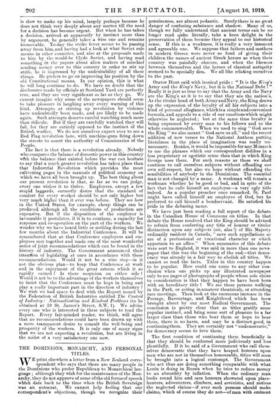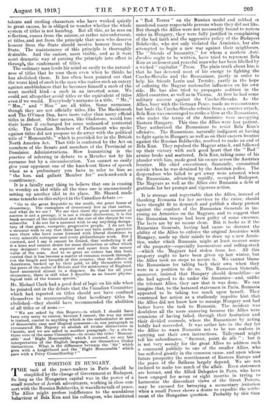THE DOMINIONS, MONARCHY, AND PERSONAL TITLES.
WE print elsewhere a letter from a New Zealand corre- spondent who says that there are many people in the Dominions who prefer Republican to Monarchical lan- guage ; although they wish for the maintenance of the Mon- arohy, they do not approve of some of the old forms of speech which date back to the time when the British Sovereign was an autocrat. We cannot help feeling that our correspondent's objections, though we recognize their genuineness, are almost pedantic. Surely there is no great danger of confusing substance and shadow. Many of us, though we fully understand that ancient terms can be no longer read quite literally, take a keen delight in the preservation of them because they appeal to our historical sense. If this is a weakness, it is really a very innocent and agreeable one. We suppose that fathers and mothers in modern Greece were never so fond of giving their children the names of ancient Greek heroes as when their country was painfully obscure, and when the likeness between themselves and the heroes of classical antiquity seemed to be specially dim. We all like relating ourselves to the past.
Orator Hunt said with ironical pride : " It is the King's Army and the King's Navy, but it is the National Debt ! " Really it is just as true to say that the Army and the Navy are the King's as it is to say that they are the nation's. As the titular head of both Army andNavy, the King draws up the expression of the loyalty of all his subjects into a kind of personal allegiance, which is a simple and convenient formula, and appeals to a side of our emotions which might otherwise be neglected ; but at the same time loyalty is being expressed by every man to his fellows and to the whole commonwealth. When we used to sing " God save the King " we also meant " God save us all," and the recent addition of new verses to the National Anthem putting literalness in the place of imagination was really un- necessary. Besides, it would be impossible for any Monarch to use the phrases which our correspondent dislikes in a less proprietary or egotistic sense than that in which King George uses them. For such reasons as these we shall continue to call ourselves subjects without offending our own self-respect, but also we hope without offending the sensibilities of anybody in the Dominions. The essential man is not changed by a name. A workman will remain a workman whether he be good or bad, and in spite of the fact that he calls himself an employee—a very ugly title indeed. As a popular preacher once remarked, St. Paul might have called himself an employee of God, but he preferred to call himself a bondservant. He satisfied his pride in the debasing name.
We have just been reading a full report of the debate in the Canadian House of Commons on titles. In that debate the House resolved that the King should be advised to refrain from conferring any title of honour or titular distinction upon any subjects (sic, alas !) of His Majesty ordinarily resident in Canada, " save such appellations as are of a professional or vocational character or which appertain to an office." When summaries of this debate were sent to England, it was said in more than one news- paper that this was the beginning of the end—that demo- cracy was already in a fair way to abolish all titles. We cannot so read the facts. Titles in this country happen to be popular. How could one come to any other con- clusion when one picks up any illustrated newspaper only to see pages of photographs of people whose sole claim to consideration is that they happen to have been born with an hereditary title ? We see these persons walking in the Park, or acting in amateur theatricals, or attending race meetings. Then look at the enormous increase in the Peerage, Baronetage, and Knighthood which has been brought about by our most Radical Government. The conclusion is pretty clear that as titles gratify some popular instinct, and bring some sort of pleasure to a far larger class than those who bear them or hope to bear them, there is no harm, and may be a distinct good, in continuingthem. They are certainly not "undemocratic," for democracy seems to love them.
The first condition of continuing them beneficially is that they should be conferred more judiciously and less plentifully. If it be said of a Government who call them- selves democratic that they have heaped honours upon men who are not in themselves honourable, titles will soon be brought into a logical contempt. The Government who act thus are doing something comparable with what Lenin is doing in Russia when he tries to reduce money to an absurdity by inflation. When the ordinary man looks round him and sees honours showered upon place- hunters, adventurers, climbers, and arrivistes, and notices the neglected claims—if ever such persons should make claims, which of course they do not—of men with eminent talents and sterling characters who have worked quietly in great causes, he is obliged to wonder whether the whole system of titles is not humbug. But all this, as he sees on reflection, comes from the misuse, or rather misconferment, of titles, and not from the principle that-men who deserve honour from the State should receive honour from the State. The maintenance of this principle is thoroughly desirable. And the easiest, most visible, and as it were most dramatic way of putting the principle into effect is through the conferment of titles. The ordinary man lends his mind so easily to the natural- ness of titles that he uses them even when he thinks he has abolished them. It has often been pointed out that the worst kind of snob is the man who makes such an outcry against snobbishness that he becomes himself a snob of the most morbid kind—a snob in an inverted sense. We could not altogether avoid titles or the equivalent of titles even if we would. Everybody's surname is a title. " Mr.," " Mrs.," and " Miss " are all titles. Some surnames, though they are not officially titles, like The Mackintosh and The O'Conor Don, have more value than many official titles in Debrett. Other names, like Gladstone, would lose their lustre if exchanged for some unheard-of territorial title. The Canadian Members of Parliament who spoke against titles did not propose to do away with the political title of " Honourable," which is provided for in the British North America Act. That title is conferred by the Act on members of the Senate and members of the Provincial or Dominion Administrations. How humanizing is the practice of referring in debate to a Member not by his surname but by a circumlocution. You cannot so easily give your opponent one of the knock-out blows of speech when as a preliminary you have to refer to him as " the hon. and gallant Member for" such-and-such a constituency.
It is a fatally easy thing to believe that one is ceasing to worship an idol while all the time one is unconsciously setting up another idol in its place. Mr. Sheard made some remarks on this subject in the Canadian debate :— " Go to the great Republic to the south, the great home of democracy. The exemplars of democracy live in that nation, and what do we see ? We see that there the great measure of success is not a peerage, it is not a titular distinction, it is the bank account of the individual and the size of the cheque he can subscribe I do not for a moment wish to say anything deroga- tory of that great, energetic, progressive people. I do not for a moment wish to say that there have not been noble, patriotic men there who have come forward with liberal donations to every scientific enterprise and every philanthropic work. But I contend, and I say it cannot be denied, that underlying it all is a keen and earnest desire for some distinction or other which may designate them as separate and apart from the money value of the man. And to so great an extent has this been carried that it has become a matter of common remark through. out the length and breadth of this country, that the efforts of Americans, backed up by their gold, to ally themselves with the peers of the realm of Britain and the aristocracy of England, have amounted almost to a disgrace. So that for all your democracy, there is still what I describe as an innate physio- logical trait of the human species."
Mr. Michael Clark had a good deal of logic on his side when he pointed out in the debate that the Canadian Committee which had reported on titles should not have confined themselves to recommending that hereditary titles be abolished—they should have recommended the abolition of all titles or of none :— " We are asked by this Report—in which I should have been very sorry to concur, because I cannot, the way my mind is trained, concur in anything which is the embodiment at once of democratic cant and illogical nonsense--in one paragraph to recommend His Majesty to abolish all titular distinctions in Canada, and we are asked in another paragraph—by a six-to- three vote of the same Committee—to retain the titles ' Honour- able ' and Right Honourable,' which I contend, on any fair interpretation of the English language, are themselves titular distinctions. What is the difference between the Sir' which goes with a knighthood and the Right Honourable' which goes with a Privy Councillorship ? "



































 Previous page
Previous page